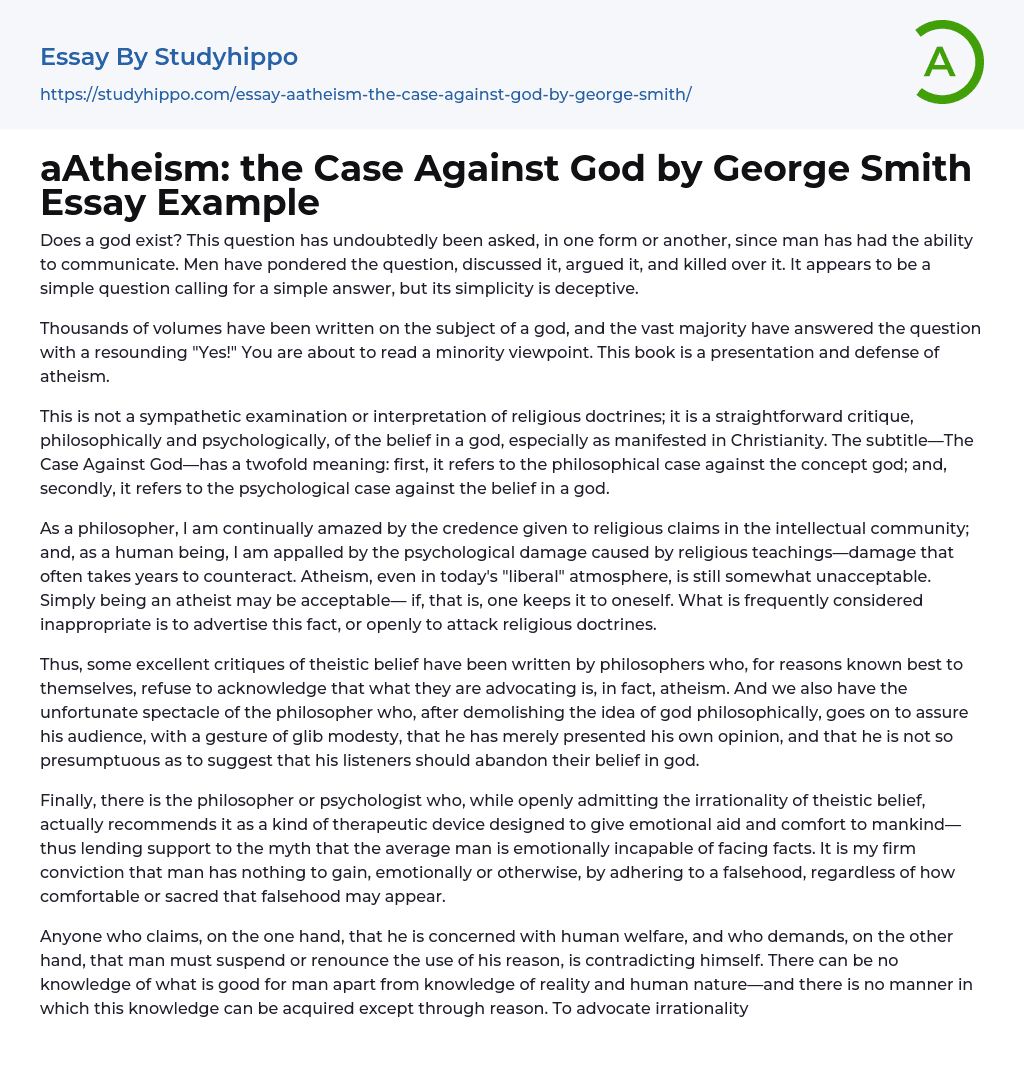Throughout human history, the inquiry into the existence of a deity has sparked exploration and discourse. People have pondered, argued, held differing opinions, and even engaged in conflicts over this topic. Although it may appear simple, the question can be deceptively complex.
The following text is enclosed within a "p" HTML tag with the "text-align: justify" style attribute:
Although many texts discuss the idea of god, most of them argue for its existence. In contrast, this book provides a unique viewpoint by presenting and validating atheism.
This paragraph critically examines the belief in a god, specifically in Christianity. It does not provide a sympathetic examination or interpretation of religious teachings. The subtitle, "The Case Against God," has dual meanings: it refers to both the philosophical argument against the existence of a god and the psychological argument ag
...ainst belief in a god.
The intellectual community highly values religious claims, which astonishes me as a philosopher. Personally, I find the emotional harm caused by religious teachings to be shocking and it requires significant time to address. Even in a supposedly "liberal" society, atheism is not fully embraced. While privately identifying as an atheist may be acceptable, openly expressing this or criticizing religious beliefs is often deemed inappropriate.
There are philosophers who critique theistic belief without admitting they support atheism, while others demolish the idea of god but clarify it as their personal opinion, not urging others to abandon their belief in god.
In conclusion, some philosophers and psychologists recognize that theistic belief is irrational but still endorse it as a therapeutic tool to offer emotional support. However, this inadvertently strengthens the
misconception that regular people cannot handle reality emotionally. I strongly believe that individuals gain no advantage, be it emotional or otherwise, from holding onto falsehoods, regardless of how comforting or sacred they may appear.
Claiming to care about human welfare while advocating for the abandonment or disregard of reason is a self-contradiction. To comprehend what benefits humans, one must possess knowledge of reality and human nature, which can only be acquired through reasoning. Promoting irrationality equates to promoting harm to human existence. My objective does not involve persuading individuals to adopt atheism since such endeavors tend to be ineffective.
The main objective is to demonstrate the absurdity of believing in god, particularly in religions like Christianity where this irrationality can have severe consequences. The ultimate goal is to remove the perceived intellectual and moral credibility linked to the concept of a deity.
Despite the ability to maintain belief in a god, logic and moral obligation can no longer be used as support. This book incorporates technical terminology due to the complexity of various religious teachings, but it is targeted at a broad audience.
The author aims to present an issue clearly and concisely without oversimplifying it, while also being fair to all parties involved. However, space limitations prevent them from covering every argument for theistic belief or addressing every objection against atheism. Therefore, they prioritize addressing the most significant issues they consider important.
This book is divided into four major parts, each discussing different topics. The first part examines theism, atheism, and agnosticism, emphasizing the difficulties and contradictions related to God. The second part delves into reason's essence and its
incompatibility with faith and revelation.
In Part Three, various efforts to employ reason for demonstrating the existence of a supernatural being are examined. It is demonstrated that each suggested proof fails to present a compelling argument. In Part Four, the adverse impact of religion on morality and the achievement of human contentment and welfare in our earthly life is discussed, with Christianity receiving special attention.
My perspective on atheism is diverse as I gather ideas from various sources to support different viewpoints. Nevertheless, it is crucial to acknowledge that utilizing a source does not imply my agreement with the atheist viewpoint presented by that source.
Supporting a specific position of an author does not imply total agreement. It is crucial to acknowledge the distinction between the two contexts in which the term "god" is utilized. The lowercase "g" signifies a supernatural being with no particular attributes.
When I mention "God," I am specifically referring to the Christian God, who is described as all-powerful and all-knowing. This distinction allows me to distinguish between the general idea of a god and the particular deity worshipped in Christianity.
To conclude, I would like to show appreciation to all those who participated in the making of this book. Unfortunately, it is not possible for me to individually acknowledge each person. However, I want to give a special thanks to two individuals who played important roles during the writing process: Roy Childs, for initiating the first line; and Sylvia Cross, my editor, whose involvement was crucial in finalizing the last line.
- Afterlife essays
- Atheism essays
- Bible essays
- Buddhism essays
- Christian Worldview essays
- Christianity essays
- Confession essays
- Cosmological Argument essays
- Deism essays
- Devil essays
- Existence of God essays
- Faith essays
- Freedom Of Religion essays
- God essays
- Hinduism essays
- Immortality essays
- Islam essays
- Jainism essays
- Jews essays
- Judaism essays
- Miracle essays
- Monk essays
- Monotheism essays
- New Testament essays
- Old Testament essays
- Pilgrimage essays
- Puritans essays
- Revelation essays
- Ritual essays
- Salvation essays
- Sin essays
- Sinners essays
- Soul essays
- Taoism essays
- Temple essays
- Theology essays
- American Literature essays
- Between The World and Me essays
- Book Report essays
- Book Review essays
- Book Summary essays
- Books essays
- Character essays
- Coming of Age essays
- Dante's Inferno essays
- Everyday Use essays
- Flowers for Algernon essays
- Genre essays
- Greek Mythology essays
- Incidents in The Life of a Slave Girl essays




